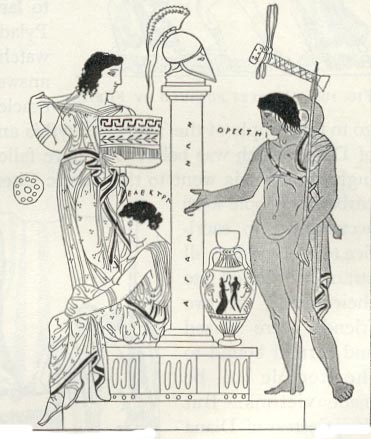Masterpieces of Western Literature
| Unit 9 |
|
English 201:
Masterpieces of Western Literature |
| Unit 9 Reading | Course Reading | Entry Page |
| Introduction | Background | . Explication | Questions | Review |
Desire/libido:
Libido
is the psychic energy that impels our life. It is first manifest
in the id or unconscious where it is ambivalent in regard to any object.
That means that what it loves can suddenly switch polarities to become
precisely what it hates. It also works the other way around.
How about that girl/boy you professed to "hate" in junior high? What
is important about libido is intensity, not polarity.
Remember that reason & logic are features of the ego, which is a tertiary
structure, resulting from the tension between the 2 earlier & more
fundamental psychic (temporal) structures of the super-ego (Oedipal displacement)
& the id (dreams). Aeschylus' characters trace or follow this
libidinal pattern:
Leadership:
Tragic
drama offers negative moral instruction. Do we want -- or can we
even survive -- leaders like AG, KLY, or Aegisthus? When they are
not simply narcissists, they believe that they are the instruments of destiny
or that they are doing God's will that always requires someone's blood;
the blood of innocence (Iphegeneia). Why is it so difficult to find
a leader that we will be happy with? Because 2 area of the psyche
are in conflict. We want what we want. The id is fickle; it
is ambivalent. What we want morphs into what we don't want, what
we can no longer stand. Libido in the id can never find stability,
permanence, or even compromise. Leaders are simply movie stars or
fashion models to be replaced by whimsy. They also operate in the
world of objective power, the world of the super-ego. We don't desire
a saint so much as need an able general, a prudent economist, a decisive
judge -- even if we aren't charmed by the person. Objective standards
are preferable to the emotional depth of AG, KLY, or Aegisthus. Thus
the play ends in celebrating an institution rather than a personality.
This promises, ultimately, something like the separation of church &
state. We will accept a state that is functional in supporting private
life. We do not require it to be virtuous but to be just. Justice
is much easier to satisfy, as the Furies illustrate when they say:
(Eum) 313 Hold out your
hands, if they are clean
no fury of ours will stalk you
you will go through life unscathed.
Virtue aspires to a higher standard than not to be indicted for a crime. Virtues are many & the place to pursue them is private life, which ceases to be private when your demands encroach on your fellow citizens.
Blood vs. Oath:
The
primal blood relationship is parent-child. We recognize (even if
we do not always condone) that many standards for moral behavior are suspended
when our son or mother is attacked. Because we love them, we indulge
or overlook their defects. In the context of the family this does
not present difficult social problems. Some implicit form of matriarchy
finds stability, as in the extend family structure of India. Conflicts
quickly arise when many families share the same civic space. By 500
bce Athens is a city of 40,000 people. If justice is left to families,
we get something like the Mafia where justice becomes one vendetta after
another, prompting Apollo to say to the Furies in disgust:
(Eum) 183 Go where heads
are severed, eyes gouged out,
where Justice & bloody slaughter are the same
An encampment, a hamlet or village may be ruled by a patron or a family
without problems. When a city is the possession of a family, it is
not really a city. It is a police state or a tyranny. The civic
bond is not blood (blood relatives), but oaths (commitment, devotion, dedication).
The model for the bond of citizenship is marriage when 2 strangers mutually
vow to cherish each other. Such a bond produces blood relations &
so we avoid asking which relationship is more fundamental. In the
context of nurturing a city, we must ask this question & we must answer
in only one way, recognizing that the oath relationship nurtures civic
friendship. Apollo decrees:
(Eum) 215 Marriage of man
& wife is Fate itself,
stronger than oaths, & Justice guards its life.
In the foxhole, I am indifferent to your color, your family, & even to your gender. The only thing that counts is whether we are comrades together who defend each other & our fellow citizens.

Orestes Meets Elektra at Agamemnon's Grave
Click on the next section: Background
above.